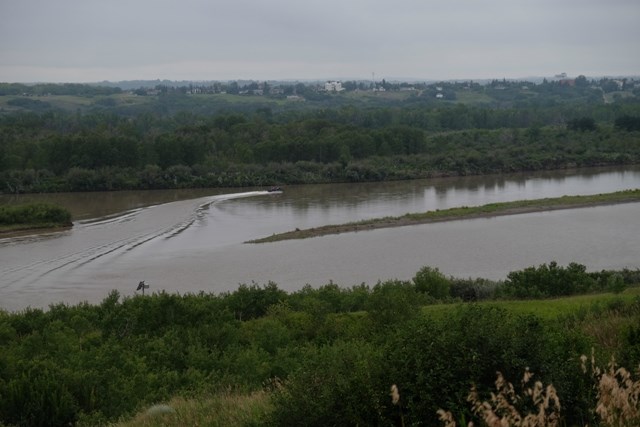During the provincial government's media teleconference Sunday morning, Wes Kotyk, executive director of the Environmental Protection Branch at the Saskatchewan Ministry of Environment, said receeding waters on the North Saskatchewan River slowed down the cleanup operation slightly Saturday, but things are returning back to pace.
A rain event in Aberta had swelled the river at the time of the pipeline oil spill, and the river levels are now returning to levels more common to this time of year, said Kotyk.
The receding levels reated new water hazards and affected cleanup and assessment activities so adjustments had to be made, he noted.
He also said a draft analysis of the result of 900 water samples collectd at 600 sample points has been received and it is being reviewed to assist decision-making as the cleanup process continues. Information from the analysis should be available in the next few days, he said.
The worst effects of the spill are from the entry point to aboug 38 kms downstream, and preliminary cleanup of the frist seven kms has been completd. Work is progressing at about two kms per day.
He also reported there were 42 wildlife mortalities discovered so far with 13 in treatment. It appears the largest animal effected as been a beaver. It is mostly birds, snakes, frogs and other shoreline animals. There have been no deer or moose affected as far as Kotyk is aware.
Meanwhile, work is contninuing on the pipe that will carry water from the Town of Battleford to North Battleford. During the provincial government's media teleconference Sunday morning, Water Security Agency official Sam Ferris said a pipe to augment North Battleford's water supply could be ready by Tuesday.
The City of North Battleford and the Town of Battleford entered into a formal agreement Friday for the Town to temporarily supply water to the City during this crisis.
This formal agreement allows the City to receive treated water from the Town’s groundwater treatment plant and feed it into the City’s distribution system. The City will be compensating the Town for the potable water based on consumed meterage.
A six-inch water line will be installed from the Town of Battleford to the City’s distribution system and this temporary line will provide approximately 20 per cent of the capacity of the now shut down F.E. Holliday Water Treatment Plant.
Other water supply options are still being investigated as this temporary pipe to the Town does not provide a solution for the winter months. As a result, other options such as additional wells being drilled for Water Treatment Plant 1 and additional filtration systems at the F.E. Holliday Water Treatment Plant to filter hydrocarbons and other possible contaminants, are being considered.
“This is a very exciting development in our quest to find effective and safe ways to relieve our community from the water restrictions”, says City Mayor Ian Hamilton. “We are grateful to the Town of Battleford to work with us and help us out in this difficult situation.”
“The Town is proud to partner with the City during this crisis. These joint efforts are a symbol of the strong cooperation and close relationship between our communities.” saysTown Mayor Derek Mahon.
In light of the recent oil spill in the North Saskatchewan River, the City of North Battleford was forced to shut off one of its Water Treatment Plants and limit water consumption for its residents and businesses July 22.
Until the new water supply from the Town is operating, water restrictions for residents will continue to remain in place. However as of July 29, laundromats were permitted to re-open due to the life necessity of this service, said a City news release.
The directive to temporarily discontinue carwash services using City water remains in effect until further notice.
In Sunday's conference call, Duane McKay, commissioner and executive director of emergency management and fire safety with the province of Saskatchewan, said of North Battleford, "There is no crisis there in terms of water."
He praised the communities affected by the oil spill for their level of coo-operation and level of sophistication with which they have been responding.
He had words of warning, however, for drivers who don't obey the speed limit reductions that have had to be imposed where work on the cleanup and, in particular, the highways north ad south of Prince Albert where pipes are being laid to bring water into that community.
There was a traffic incident there yesterday, he said, in which a driver disobeyed the speed limit, hit the steel devices that create a ramp for vehicles to pass over the pipe where it crosses the road, and caused damage that slowed down the project.
Fortunately, the pipe had not yet been charged with water at that point, said McKay. If the pipe had been charged, it would have created a devasating delay of 10 to 12 hours.
The driver who caused yesterday's delay, "did not stick around."




